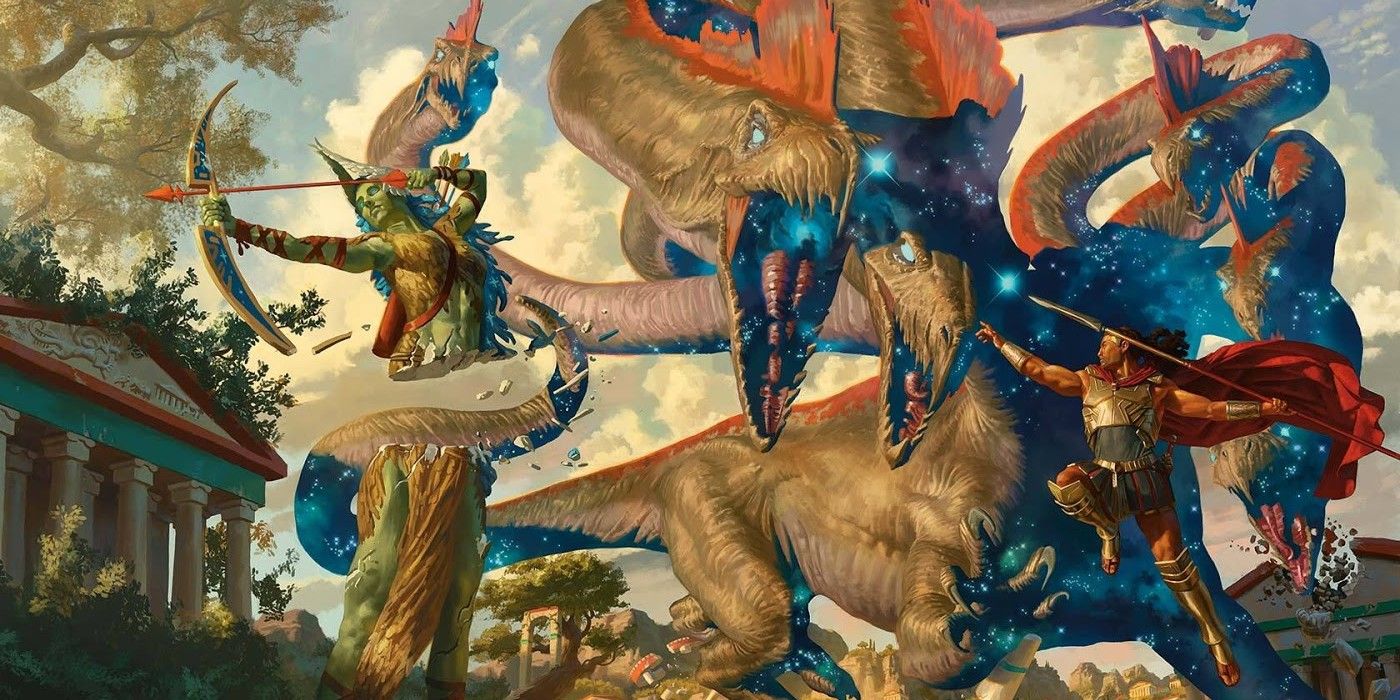How to Use the New Piety System in a Dungeons and Dragons Campaign

Along with the new Mythic Odysseys of Theros handbook that Wizards of the Coast released this week on DnD Beyond comes unique content that fans of Dungeons and Dragons can incorporate into their campaigns. One of these features that the book spends nearly a chapter of space to flush out is piety. While gods and deities have been a big part of the roleplaying game (as well as Magic: The Gathering, the game that the world of Theros originally comes from), many players feel that they're only significant to the Clerics and Paladins that wield their power, and even then their individual godly influence can stop at what domain or oath a character chooses to take.
With the Piety System that Mythic Odysseys of Theros brings to the Dungeons and Dragons roleplay table, DMs have the potential to give more depth to the deities they've built in their D&D worlds while giving players another aspect to incorporate into complex characters' personality and motivations. Here's what you need to know before using this system in your game.
The Piety System revolves around Piety Points, which a character can gain or lose depending on the actions they choose to take in-game. Each deity has principles and goals that they ascribe to and look for in their followers. The system isn't specifically geared towards faith or personal beliefs. Instead, players gain points due to actions that their characters do in-game that align with the deity's duty and purpose in the world. Similarly, if characters behave in ways that are directly the opposite of what the deity they declared to follow's ideals, then the DM may rule that the character loses points. According to the recently released Dungeons and Dragon's handbook, players may earn around one point a session as long as they follow their chosen god's path and it fits with the pacing the DM is going for.

Points aren't earned easily. Deities give these points to those who they deem worthy of becoming their champions, and becoming a god's champion is never an easy task. A character must prove that their devotion is worthy of the deity's attention. The book uses as examples such as finishing an adventure, performing a significant sacrifice of their self-interest, or whenever the DM believes the character has done something that warrants a Piety Point. Mythic Odysseys of Theros also gives examples of what specific deities may consider, like the Athreos, the god of passage, would place value on a follower performing a ritual that would allow someone who passed away in a tragedy to peacefully journey into the next life.
When gods give a gift because a player has curried favor with the deity, it's usually something that's really powerful. Piety Points are the same way, and their boons build up the more a player accumulates. When players reach 3, 10, 25, and 50 Piety Points, they can earn new abilities and learn new spells they can cast using this feature. On the higher levels in some cases, players can increase certain stats above their maximum limit which can further aid the party in battling the monstrosities the campaign is sure to throw at them. Each individual deity gives different boons, so characters should choose their allegiances wisely.
The Mythic Odyssey of Theros also has special magic weapons that are affected by a character's piety points as well. If a character wields a godly weapon that corresponds to the deity that they've chosen to follow, then the weapon will get special magical effects.
Mythic Odysseys of Theros gives specific examples of how certain deities can influence characters, but this mechanic isn't limited to ones listed in the book. If players want their characters to see results from their god, they can talk to their DM and see if the Piety System can be worked into the world's already existing framework. If DMs want to make deities more impactful to the average player in their D&D campaign, this is a great way to get players more invested and aware of their moral actions in the game. With this system, even non-deity related classes like Wizards or Rangers can feel the effect of what it's like to wield a god's power.
Mythic Odysseys of Theros is available now on DnD Beyond.
Source: D&D Beyond

Post a Comment